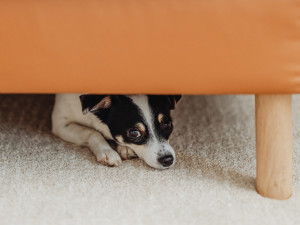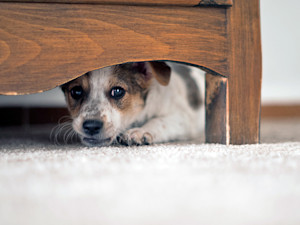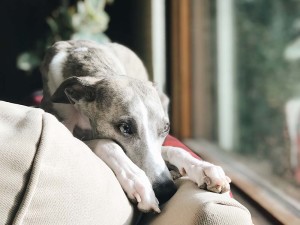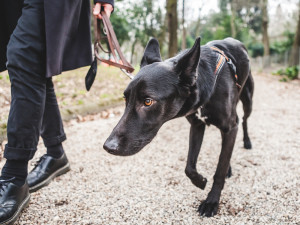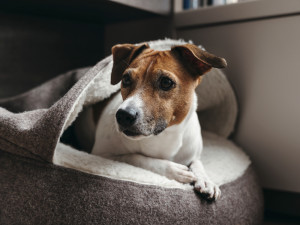Firework Fear? Here’s How to Help Your Dog Stay Calm This Season
From calming supplements to creating safe spaces, here’s how you can prepare your pup for firework season
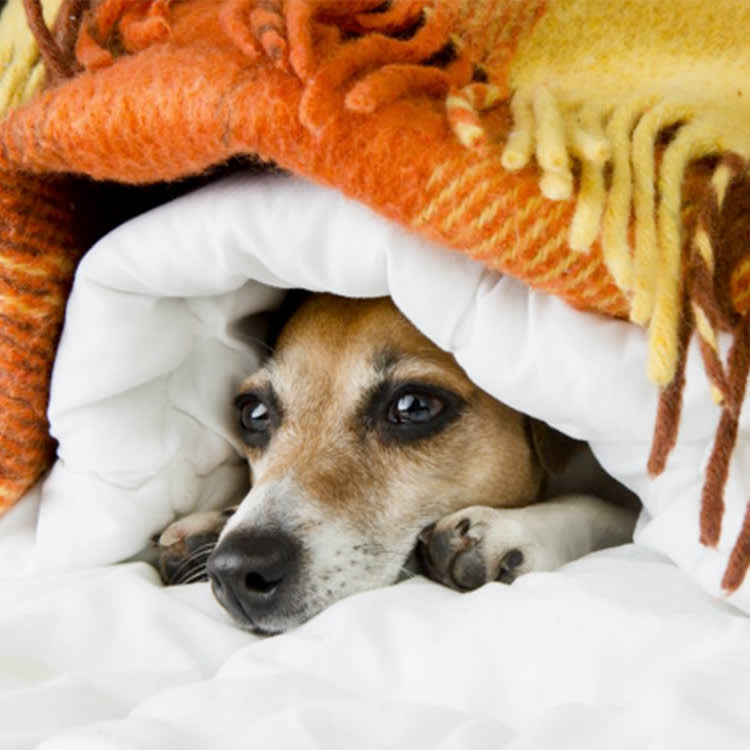
Share Article
As the festive period draws near, celebrations such as Diwali and Bonfire Night mark the beginning of firework season (which arguably continues right up until New Year’s Eve). Whilst we humans might enjoy the dazzling displays lighting up the night sky, this time of year can be incredibly stressful for our dogs.
The 2022 PDSA Animal Wellbeing (PAW) Reportopens in a new tab stated that 41 percent of dogs are frightened of fireworks. Many dogs are noise-sensitiveopens in a new tab and can become anxious around loud or sudden noises. Fireworks may cause your dog to tremble or shake, to seek a hiding place, or pace back and forth. Your dog might also stop eating or they may avoid walks.

littleKin™ is Kinship’s home just for puppy and kitten parents. Bop over to check out expert advice, new pet tools, and special deals—all curated for your newest family member.
opens in a new tabWhilst the fear of fireworks can lead to anxietyopens in a new tab and stress in dogs, there’s no need for you to panic too – it’s not too late to help your dog feel safe at this time of year. From creating a calm environment, to adding natural supplementation, there are plenty of ways to ensure your dog feels more secure and has their most relaxed firework season yet.
Why are dogs scared of fireworks?
Dogs are often afraid of fireworks due to the loud volume of sound, increased by their sensitive hearingopens in a new tab. Firework sounds are also unpredictable and the exact reason they appeal so much to humans can actually have a detrimental effect on dogs; they might whizz or bang and your pup can’t anticipate when the next explosion will occur. “Our pets’ enhanced senses mean they can find the loud noises and bright flashes from fireworks overwhelming, which can lead to severe anxiety, trauma and even injuries,” explains Nina Downing, a veterinary nurse with the People’s Dispensary for Sick Animals (PDSA).
Medical conditions – particularly those that create pain in a dog’s body, such as ear infections, injuries, and arthritis – can also contribute to noise sensitivityopens in a new tab and firework fear in dogsopens in a new tab. It’s important to get your dog checked out by your vets to rule out any medical causes if you see them suddenly becoming anxious around loud noises.
How to prepare your dog for fireworks
Preparation in advance of the firework season is just as important as how you help support your dog when the loud bangs can actually be heard. Make a list today of all the things you can do to help get ready in advance.
Secure your home and garden
Dogs who are feeling scared, sometimes choose to flee (hello flight or fight response). Avoid your dog escaping by securing your home and gardenopens in a new tab ahead of time. The PDSA recommends you, “ensure any possible escape routes – such as holes in fences – are inaccessible or closed off. Also check that your pet’s microchip details are up to date to give you a better chance of being reunited if they do run away from home”.
Create a safe space for your dog
Whilst some dogs prefer space to pace when they’re feeling scared, others might like a secure hiding place. Choose a quiet area of your home and fill it with blankets that can muffle the sounds and allow your dog to dig or curl up within. Think about where your dog usually likes to go and seek sanctuary – is it in a crate, under your bed, or under blankets? This will help you to set up the right sort of hiding space for your dog to feel safe in.
Adjust your routine
Bring your walking times forwards now to allow your dog to adjust to walking at a different time of the day – a lighter, quieter time – so that their internal schedule has adjusted by the time you want to avoid the fireworks at night when its dark. You can also introduce a rest day to your dog’s week if the noise is becoming too overstimulating – a day off from traditional walks, only leaving your home for quick toilet trips – and encourage more mental stimulationopens in a new tab through training or scent work on those days.
Mealtimes can also be brought forwards now too, so your dog has time to adjust – as they may be inclined to skip dinner if they’re feeling anxious during the firework period. (Do this slowly, however, bringing forward their dinner time by 15–30 minutes each day until you reach the target time).
Calming products
Whilst some dogs with extreme fears will need the support of pharmaceutical medication from your vet, others can benefit from natural supplementation. Using calming, pet-safe scentsopens in a new tab in parts of your home, such as linden blossom floral water or lavender, allows your dog the choice of going into those spaces for a calming sniff if required.
Calming supplementsopens in a new tab that include ingredients such as valerian, tryptophan, L-theanine and B-vitamins can also be useful to boost your dog’s good mood. Thunder shirts also work well for some dogs, providing a swaddling effect.
Desensitisation training
Desensitisation training is a gradual process to help your dog experience a slow, positive exposure to loud sounds such as fireworks. Start by playing recordings of fireworks at a very low volume paired with something positive for your dog – such as playtime or a long lasting tasty chew. Gradually you can increase the volume over days or weeks, watching your dog carefully for any signs of anxiety along the way. It can be useful to work alongside an ethical behaviourist to ensure this is the right approach for your dog.
What to do to help your dog during fireworks
Firework season can be challenging for dogs, but there are several things you can do to help ease their stress and keep them as comfortable as possible. By creating a calm, safe environment and offering reassurance when needed, you can make a big difference in how your dog experiences this stressful time.
Think positively and try to keep calm yourself – dogs can pick up when their parents are anxious..
Close curtains and keep all your lights on to block out the visual impact of fireworks.
Play some calming music – soft rock, reggae and classical genresopens in a new tab are thought to most benefit dogs!
Let your dog out for a toilet break before it gets dark.
Give your dog comfort if they seek it.
Provide different spaces for your dog to hide if they want to.
If your dog can engage, boost their mood with simple training, energetic playtime or a tasty treat search around your home.
What not to do with your dog during fireworks
It’s just as important to avoid certain actions that could increase your dog’s anxiety during fireworks. Understanding what to steer clear of can prevent further distress and help your dog feel more secure in their environment.
Don’t walk your dog after dark – try to walk your dog when it’s light and there are no fireworks.
Don’t leave your dog home alone – ensure there’s always someone with them.
Don’t force your dog to stay in the room with you if they want to hide – provide them with several comfortable spaces to rest.
If your dog is highly anxious, don’t ask them to go out into your garden to toilet before bed, especially if fireworks are still going off. Instead, set an alarm for the early hours of the morning to let them out then.
Frequently asked questions
Can I take my dog for a walk during fireworks?
Try to walk your dog earlier in the day, and avoid going out after dusk when you may hear fireworks. Always keep them on a lead. If your dog seems stressed from the night before, give them a rest day – instead focusing on mental stimulation.
Should I comfort my dog during fireworks?
If your dog seeks out your comfort, give them the support they need. You cannot increase fear behaviours by providing them with attention. If they want to hide instead however, allow them to do so.
Can I leave my dog alone during fireworks?
Never leave an anxious dog alone, they may injure themselves or feel more stressed without you to comfort them.

Caroline Wilkinson
Caroline Wilkinson is a Certified Animal Behaviourist. As the Founder of digital pet coaching service Barket Place, Caroline has a passion for improving connections between human and hound, with a focus on relationships and reduction of stress for canines living in a human world.
Related articles
![A dog standing in a lavender field.]() opens in a new tab
opens in a new tabDo Essential Oils Pass the Smell Test?
A psychologist explains how stimulating scents can influence a dog’s behaviour
![Shy black dog walking with owner at the park.]() opens in a new tab
opens in a new tabHow to Help an Anxious Dog Conquer Their Fears
Six animal behaviourists share pro tips for boosting the confidence of a fearful dog
![Dog hiding under bed]() opens in a new tab
opens in a new tabDoes Your Dog Freak Out at Loud Noises? Here’s How to Help Them
Is your dog scared of every little noise? Here’s how to turn the volume down on their anxiety
![A dog looking timid in his bed]() opens in a new tab
opens in a new tabHow to Help Thunder-Phobic Dogs
Tips for comforting your pup during a storm
